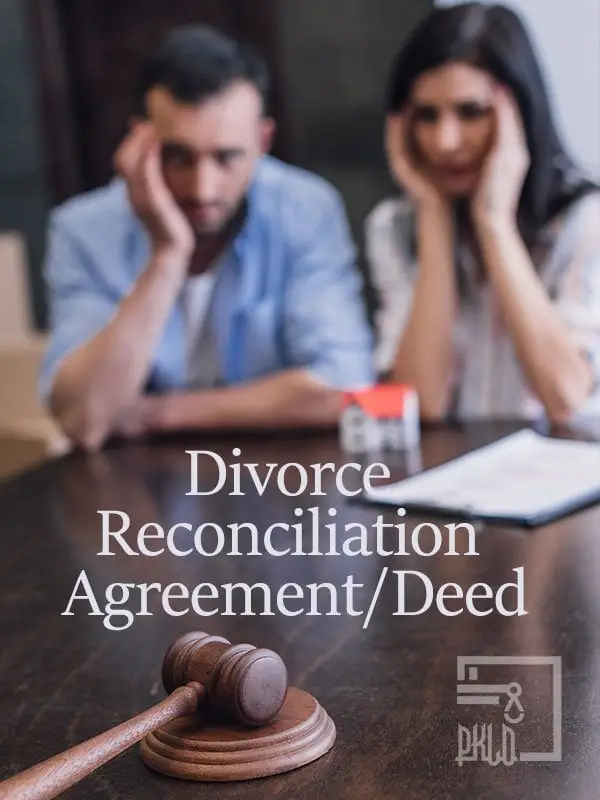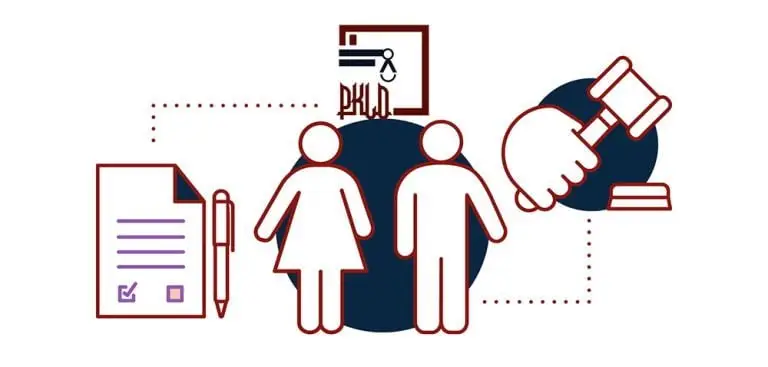Divorce Reconciliation Deed
Family Law, Divorce Law in Pakistan

In Pakistan, a Divorce Reconciliation Deed is a legal document that aims to reconcile a married couple who is contemplating divorce. This deed is used when a couple is going through marital issues and wishes to explore the possibility of resolving their differences and continuing their marriage rather than proceeding with a divorce either under Section 7 of the Muslim Family Laws Ordinance, 1961, or khulla proceedings are happening in the Family Court. It essentially reflects the mutual agreement of the spouses to give their marriage another chance and work towards reconciliation.
What is Divorce Reconciliation Deed in Pakistan?
The Divorce Reconciliation Deed outlines the terms and conditions agreed upon by both spouses to address the issues that have led to the breakdown of their marriage. These terms may include conditions for improved communication, counseling, and seeking assistance from family or professionals to resolve their conflicts.
Couples can consider making a Divorce Reconciliation Deed when they are willing to invest the effort required to rebuild their relationship. This can be an option when both spouses genuinely believe that they can address their differences, improve their understanding, and work towards a healthier and happier marital life.

Should I Consult with a Divorce Lawyer for Divorce Reconciliation Deed?
Legal advice and assistance are crucial when drafting a Divorce Reconciliation Deed to ensure that the terms and conditions are clear, fair, and legally binding. If you’re considering this option, it’s recommended to consult our qualified family lawyer in Pakistan to guide you through the process and provide relevant legal counsel.
What points should I keep in mind while drafting of a divorce reconciliation deed?
Drafting a comprehensive and effective Divorce Reconciliation Deed in Pakistan requires careful consideration of various legal, emotional, and practical aspects. Here’s a general guideline on how to approach drafting such a deed:
Consult with a Family Lawyer:
Before proceeding, it’s advisable to consult with an experienced family lawyer in Pakistan who can guide you through the legal requirements and implications of the deed.Mutual Consent:
Ensure that both spouses are genuinely willing to reconcile and give their marriage another chance. A successful reconciliation requires the commitment of both parties.Identify Key Issues:
Clearly identify the main issues that have contributed to the breakdown of the marriage. These could be communication problems, financial issues, misunderstandings, or other challenges.Terms of Reconciliation:
Outline the terms and conditions that both parties agree to follow to work on their reconciliation. This may include commitments to attend counseling sessions, open communication, seeking family support, and addressing the underlying issues.Signatures and Witnesses:
Both spouses should sign the deed in the presence of witnesses. These witnesses should be individuals who are not related to either party and can testify to the voluntary nature of the agreement.Registration:
Although not mandatory, registering the deed can add an extra layer of authenticity and legal validity.
Remember that while a Divorce Reconciliation Deed can provide a platform for rebuilding a relationship, it’s important to be realistic about the prospects of success. If the issues persist and reconciliation efforts are unsuccessful, it’s crucial to prioritize the well-being and happiness of both parties.
Can I prepare a Divorce Reconciliation Deed myself?
Yes, you can prepare a Divorce Reconciliation Deed yourself. We have uploaded a basic format of a divorce reconciliation deed on the bottom of this page. You can download sample divorce reconciliation deed from our website and follow the format with input of your personal information.
However, it’s highly recommended to seek legal advice and assistance, especially in matters as sensitive and legally significant as family reconciliation and divorce. Here’s why:
Legal Expertise:
Family law in Pakistan can be complex, and legal documents require precise language to ensure they are legally valid and enforceable. A lawyer with expertise in family law can help you draft a deed that covers all necessary legal aspects.Customization:
Every marriage and situation is unique. A lawyer can help tailor the terms of the reconciliation deed to your specific circumstances, ensuring that all relevant issues are addressed.Legal Requirements:
There are legal requirements for a document to be considered a legally binding agreement. An experienced lawyer will ensure that your deed meets these requirements and is enforceable in case of disputes.Objective Advice:
Emotions can cloud judgment during a difficult time like divorce or reconciliation. A lawyer can provide you with objective advice and help you consider all legal implications.Future Protection:
A professionally prepared deed can help protect your interests in case the reconciliation efforts are unsuccessful. It can outline terms for the possibility of future separation or divorce, safeguarding your rights.Avoid Mistakes:
Legal documents often contain specific language and clauses that may not be apparent to someone without legal training. Mistakes in drafting can have unintended consequences.Legal Consequences:
If you draft a deed without proper legal guidance, you might inadvertently waive important rights or agree to terms that are not in your best interest.Mediation and Negotiation:
A lawyer can help mediate discussions between you and your spouse, facilitating open communication and negotiation to increase the chances of a successful reconciliation.
While you might be tempted to prepare the deed yourself to save costs, the potential risks and consequences of doing so without legal expertise can far outweigh any initial savings. It's advisable to consult with a family lawyer who can guide you through the process, ensure that your rights are protected, and help you make informed decisions during this critical phase.

